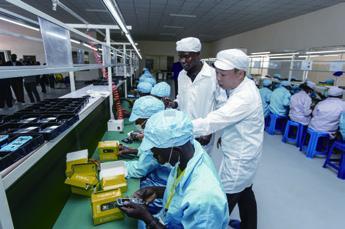Toward a Stronger China-Africa Community
2020-01-07

Yang Jiechi, a member of the Political Bureau of the Communist Party of China Central Committee and former foreign minister, addresses China-Africa relations following his recent visits to Uganda, the Republic of the Congo and Senegal. This is an edited version of his interview with Xinhua News Agency from December 20, 2019
What are your expectations for developing China-Africa relations in the complex and f luid international landscape?
Yang Jiechi: This year (2019) marks the 70th anniversary of New Chinas diplomacy. Over the past 70 years, the unbreakable friendship between China and Africa has stood the test of time and international vicissitudes and has continued to fl ourish. Developing friendly ties and cooperation with African countries has been the consistent basic policy and firm strategic direction of Chinas diplomacy.
President Xi Jinping has given personal attention to this relationship. Since he took offi ce, he has visited Africa four times and held meetings or talks with most African leaders. He has proposed the principles of sincerity, real results, amity and good faith and the pursuit of the greater good and shared interests in Chinas relations with Africa. This has pointed the way for and lent strong impetus to the advancement of friendship and cooperation between China and Africa.
The Beijing Summit of the Forum on China-Africa Cooperation (FOCAC) in 2018 was a great success and a historic milestone of solidarity and cooperation between China and Africa. Both sides agreed to build an even stronger ChinaAfrica community with a shared future and chart the course for the further growth of China-Africa relations. Under the new circumstances, it is the shared aspirations of China and Africa to renew their traditional friendship and deepen friendly cooperation. Rain or shine, China will continue to stick together with Africa, shoulder to shoulder and hand in hand, to carry forward this friendship forged by the older generations of Chinese and African leaders.
With the official launch of the African Continental Free Trade Area (AfCFTA) [in 2018], Africa has come to a critical stage in its transformation and development. Now is a prime time for China and Africa to advance Belt and Road cooperation. To date, 44 African countries and the African Union(AU) Commission have signed Belt and Road cooperation documents with China. Steps have been taken to enhance synergy between China-Africa Belt and Road cooperation and the AUs Agenda 2063, the UN 2030 Agenda for Sustainable Development, and the development strategies of African countries. China will work with Africa for higher quality and effi ciency of our practical cooperation, so that together we can deliver greater benefi ts to our two peoples and set a fine example of mutually beneficial cooperation between developing countries.
The world is undergoing profound changes unseen in a century. A large group of emerging markets and developing countries are growing rapidly. At the same time, unilateralism, protectionism and bullying are on the rise in international affairs, bringing more uncertainty and instability to the world.
As underlined in the Beijing Declaration—Toward an Even Stronger China-Africa Community With a Shared Future—issued at the FOCAC Beijing Summit, China, the worlds largest developing country, and Africa, the continent with the largest number of developing countries, have supported and cooperated closely with each other in international affairs.
Under the new circumstances, enhanced strategic coordination between China and Africa serves the common interests of both sides and contributes more to upholding multilateralism and equity and justice. Both China and Africa firmly safeguard the international system underpinned by the UN, the international order anchored on international law, and the multilateral trading system centered on World Trade Organization rules.
No matter how the international situation may evolve, China will stand firm with Africa to jointly uphold the legitimate rights and interests of developing countries, safeguard multilateralism and international equity and justice, and contribute to the building of a new type of international relations and a community with a shared future for humanity.
What do you think of the situation in Africa?
The international community is paying closer attention to Africa as many countries expand cooperation with the continent.
My visits to African countries have impressed upon me that Africa is a land of promise that has come a long way in its development and shown enormous growth potential. With overall peace and stability, African countries are actively pursuing economic diversification and sustainable, home-grown development, and have maintained a strong momentum of growth.
The AfCFTA marked another major step forward in African integration. Africa is set to further unleash its growth potential. The continent is seeing its influence in international affairs rising and is receiving increasing international attention and investment. This trend means more alternatives for cooperation and muchneeded capital and technology for Africas growth. It will also help Africa improve its environment for development and realize industrialization and sustainable, homegrown development at an early date.
